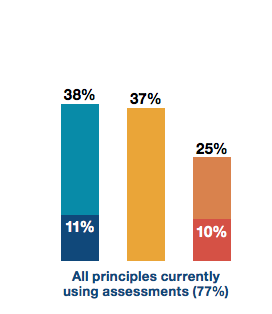There were a couple of positions that stood out for me in the President’s speech, but the one that piqued my interest most was the President’s call for a boost to vocational education—something we now know as Career and Technical Education or CTE.
For the longest time I, and many others, have believed that the “… and career” portion of college and career readiness has been a bit forgotten, so I was pleased to hear the President say that we must “invest in workforce development and job training.” US Education Secretary Betsy DeVos echoed the President’s comments after the speech, saying, “America must do better to prepare our students for success in 21st century economy,” and she went on to call on Congress to “act in the best interest of students and expand access to more education pathways.”
I don’t know anyone who can’t get behind the idea of providing more pathways for students to succeed. There’s just one problem: The President’s own budget calls for slashing more than $2 billion in funding for CTE and workforce development programs.
These cuts include eliminating $166 million in state grants aimed at funding the development, enhancement and implementation of innovative CTE programs in STEM fields as well as a 12% reduction to the USED’s overall career, technical and adult education office. The proposed cuts to the Labor Department total about $2.5 billion, a 21% reduction to the very department overseeing the workforce training programs that would be critical to the President’s vision for new investments in our nation’s infrastructure and apprenticeship expansions.
This past year ACT worked with the State of Nevada to implement ACT WorkKeys assessments and the National Career Readiness Certificate (NCRC) in two of the state’s graduation pathways, and we’ve seen more and more states seek opportunities to find new ways to provide CTE pathways so that more and more students can succeed. In reviewing governors’ state-of-the-state addresses last year, 24 state governors stressed the importance of CTE and workforce development, with many calling for expanded programs and pathways to success. Subsequently, 49 states implemented 241 policy actions in 2017 related to CTE and career readiness.
ACT’s own recently issued policy platforms in workforce development, CTE, K12, and higher education contain clear recommendations for federal and state lawmakers to create the kind of pathways the President called for last night. Clearly the “… and career” part of college and career readiness is taking hold and becoming an important pathway to individual’s success—the President said so, the Secretary of Education said so, state governors are saying so—but such an expansion realistically requires a sound partnership of investments between the federal government and the states.
If the President is serious about expanding CTE and workforce development, then it’s time for the policies and budget proposals emanating from his own administration to match his rhetoric. The President’s fiscal year 2019 budget request is due to Congress on February 12. If the President is serious about “lifting our citizens from welfare to work, from dependence to independence, and from poverty to prosperity,” then we’re all in. But states, schools, local workforce boards and training and development agencies need resources to truly prepare the American workforce for all of the emerging economic opportunities that the 21st century has in store.


















